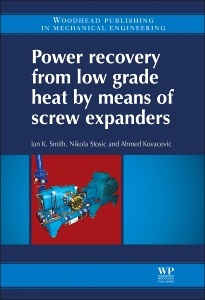Description
Power Recovery from Low Grade Heat by Means of Screw Expanders
Language: English
Subject for Power Recovery from Low Grade Heat by Means of Screw...:
272 p. · 15.5x23.2 cm · Hardback
Description
/li>Contents
/li>Readership
/li>Biography
/li>Comment
/li>
Current concerns with climate change have resulted in greatly increased interest in power recovery from low grade heat sources. This includes both hot fluid streams which can be expanded directly to produce mechanical power and those which act as a source of heat to closed cycle power generation systems. Power recovery from low grate heat by means of screw expanders with a generalised overview of how best to recover power from such sources, based on thermodynamic considerations, which differs to the approach used in classical thermodynamics textbooks and which includes an introductory description of the types of working fluid that are used in systems used to recover power from such sources and the criteria that must be taken into account in their selection. This is followed by a description of the mathematical modelling of twin screw machine geometry. The modelling of the thermodynamics and fluid flow through such machines is then given, together with how this is used to predict their performance. Finally a detailed description is given of systems currently used or projected both for direct expansion of the source fluid and by recovery of heat from it, which includes those which are particularly suited to the use of screw expanders in place of turbines.
Nikola Stosic is professor of Positive Displacement Compressor Technology at City University, London, UK, and is widely recognised as a world authority on twin screw machines.
Ahmed Kovacevic is Howden Professor of Engineering Design at City University, London, UK, and has wide experience in the design of screw compressors and expanders
- A novel generalised approach to the thermodynamics of power recovery from low grade heat systems
- Gives criteria for working fluid selection
- Provides details of, and how to model, screw expander geometry
- Details how to estimate screw expander performance
- Surveys types of system used for power recovery from low grade heat and where this can be improved by the use of screw expanders.
These books may interest you

Advanced Power Generation Systems 137.79 €


